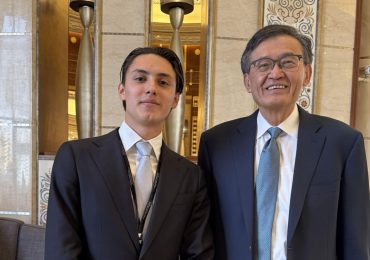Photo Courtesy of Abla Darwish
When leaders live the strategy, transformation becomes inevitable. With nearly two decades of experience across Big Four consulting and senior executive roles in the Middle East and North Africa, Abla Darwish has chosen to rewire how she approaches enterprise change. Rather than treating strategy as a static plan, she adopts it as an operating system to be lived, tested, and adapted. Her recognition with a 2025 Global Recognition Award reflects a career built on showing that lasting transformation begins from the inside out.
From Communication to Ownership
For Darwish, the hardest part of strategy isn’t writing it; it’s embedding it so deeply that it becomes the organization’s reflex. Too often, strategy sits in a deck or a speech, separate from how decisions are made.
She approaches it as an operating system, something that shapes how choices are taken, how leaders show up, and how value gets created. Her breakthrough was simple but powerful: make every leader carry the strategy by teaching it back.
“The key is ownership. A strategy becomes real only when leaders across the enterprise can present it back with real examples of how it comes to life in their world. That creates unavoidable ownership.”
This principle came to life during the redesign of an operating model across ten business verticals, where cycle times improved by a third. Every leader was asked to stand up and show how the strategy came alive in their part of the business. It didn’t just prove understanding; it revealed interlocks across silos and created what Darwish calls “unavoidable ownership.”
From there, the work was to hard-wire the strategy into governance, KPIs, and incentives so it became muscle memory. Over time, people stopped asking “what’s the strategy?” because it was already how they planned, reviewed, and decided.
“Strategy only matters when people can perform it, not just read it. When leaders carry it, silos dissolve and strategy moves from message to muscle, from words on paper to the way the organization breathes.”
Principles of Purposeful Innovation
Darwish believes innovation doesn’t have to be disruptive to create impact.
“We’ve been taught to equate innovation with moonshots and category killers. But most real impact comes from relentless, almost obsessive refinement of what already exists. The iPod wasn’t the first MP3 player, and the iPhone wasn’t the first smartphone. What set them apart was how they made the ordinary feel extraordinary.”
She is quick to add that disruption has its place. Some breakthroughs reshape entire playing fields such as payment platforms, super-apps, and digital banking. But she doesn’t see disruption and evolution as rivals. They are complementary. One reinvents the system, the other refines it, and often they unfold together.
“Disruption excites, but evolution endures. The best companies don’t ask which is better, they ask what’s the purpose, what’s the context, and what lever creates impact now.”
Her thinking is shaped by early experience co-leading one of the region’s first on-demand labor platforms. Those lessons still guide her approach today: solve real problems, build the ecosystem around the solution, and never lose sight of trust.
“The hardest currency in digital isn’t capital, it’s trust. Pair that with a clear North Star and the discipline not to do everything at once, and you give a platform the chance to last.”
“Innovation isn’t disruption versus evolution. It’s about purpose. Sometimes the leap rewrites the system. Sometimes the step transforms the experience.”
Fast and Enduring Change
One of Darwish’s guiding choices is to reject the false trade-off between quick wins and sustainability.
“The trap in transformation is thinking it must be either fast or lasting. You need both. Early wins to prove traction, and long-term scaffolding so it endures.”
But for her, transformation is not disruption for its own sake. It begins with clarity, knowing what must evolve and what must be protected.
“Too often, people arrive declaring transformation and end up dismantling the very things that made the product or service special. Real transformation builds on that core. It creates and innovates around it, not over it.”
By anchoring change in what gives an organization its strength, Darwish ensures momentum comes not from tearing things down, but from amplifying what already works.
“Transformation isn’t about tearing things down. It’s about knowing what to carry forward.”
Leading From the Inside Out
For Abla Darwish, transformation is not about creating new rules. It is about making conscious choices to adopt strategy as a living system, to embed trust into change, and to rewire how decisions move.
Her principles show that when leaders carry the strategy instead of simply communicating it, transformation is no longer an initiative. It becomes a way of working, and a way of leading.
“When leaders carry the strategy, change stops being imposed. It becomes lived.”
















